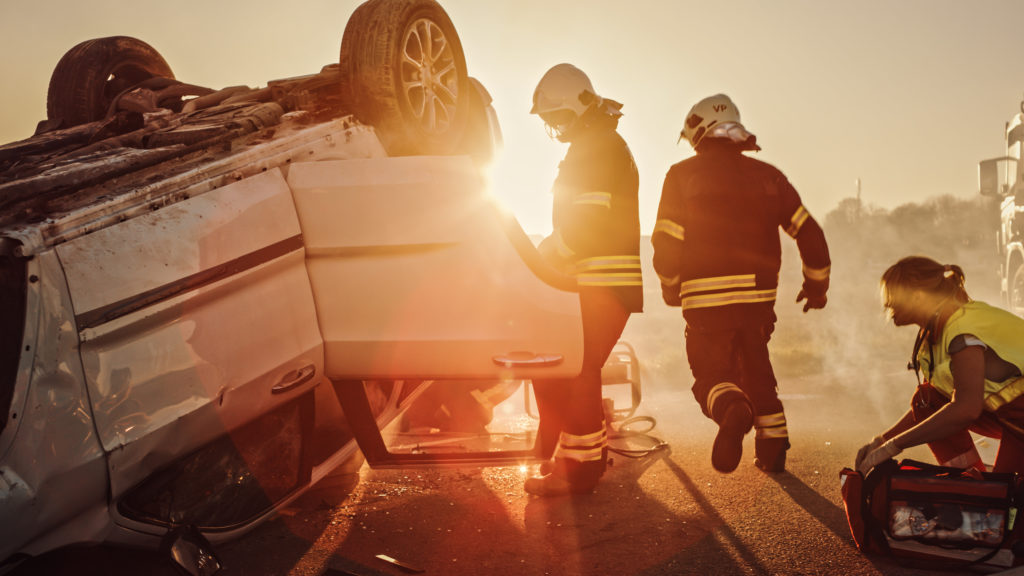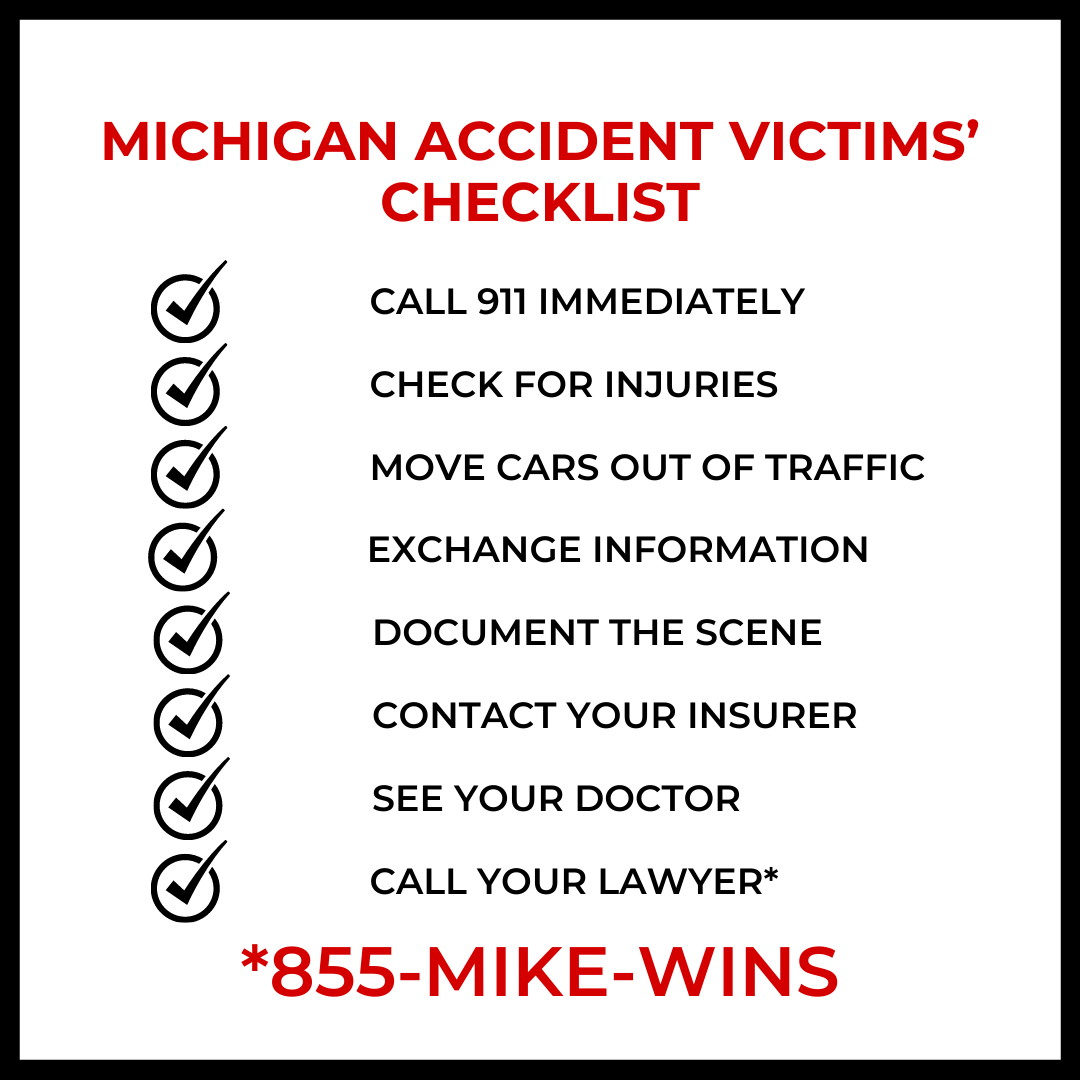- News
- What Should I Do if I Get in a Car Accident?
What Should I Do if I Get in a Car Accident?

A Step-By-Step Guide to Reduce Post-Accident Stress.
Bang! Whether that jarring sound comes from a rear-end collision, or you’ve been T-boned by someone running a red light, no one is ever prepared to hear it. After all, that’s why we refer to such incidents as accidents.
But, if you have a plan formulated ahead of time, you’ll be far better equipped to deal with the aftermath of any type of car collision. We’ve compiled this guide to prepare you as much as possible if you’re unfortunate enough to be involved in a car accident on Michigan’s roads.
Steps to Take Before an Accident Happens
- Have necessary paperwork handy. That includes your vehicle registration, driver’s license, and proof of insurance — these key documents will be necessary any time you deal with law enforcement. Also, be sure your license plate tabs and driver’s license are current. Michigan Secretary of State encourages drivers to store their vehicle registration on their phones for immediate and convenient access of electronic records.
- Know your car insurance coverage. How long has it been since you’ve checked your insurance policy? Do you know the amount of your collision deductible? Could you afford to pay that amount if you get in an accident? If not, you may consider contacting your insurance company to adjust your policy terms. We suggest you adopt a similar approach to your Personal Injury Protection (PIP) coverage. Hospital bills following major car accidents can easily add up to hundreds of thousands of dollars so, if you’ve chosen to limit PIP benefits to less-than-unlimited coverage, you may wish to reconsider that decision.
Steps to Take Immediately After the Accident

- Call 911. This should always be your first action if you’ve been in an accident. Police officers are trained to offer emergency first aid, get ambulances on scene if needed, de-escalate stressful situations, and mitigate traffic hazards. Even though Michigan is a no-fault insurance state, officers can take steps to determine blame and may issue tickets to drivers who have violated traffic laws. A police report will be useful for both insurance claims and future use in any personal injury litigation that may arise from the accident.
- Check for injuries. While not all traffic-accident-related injuries will be immediately apparent, it’s important to tend to people with critical or urgent needs. If someone is bleeding, use basic first aid techniques, such as applying pressure to wounds to hinder blood loss. If someone is not breathing, you may need to administer CPR. Move an injured person only if it would be dangerous to leave them in place (for example, if there is leaking fuel or onrushing traffic at the accident scene).
- Move cars out of traffic lanes. If possible, without endangering others, move the vehicles involved in the accident off the road and onto shoulders or nearby side streets. This will make it easier for first responders to reach the scene. If needed, call a towing service at this time.
- Exchange necessary information. It may not be a comfortable conversation, but in most accident situations, you’ll want to exchange insurance information (company name, policy number, etc.) with the other driver, in addition to driver’s license number, phone number, and address. To simplify things, you could take photos of any relevant documents with your phone. You should also take note of the make and model of the other vehicle(s) involved and gather the name(s) and age(s)of any passenger(s).
- Document the scene. Your phone can be very beneficial in gathering photos of the accident, including any nearby traffic signals, signs, road hazards, or additional factors that could have contributed to the collision. You can also use your phone to film the scene and gather information or statements from witnesses. Be sure to get the names and contact information from other people who were at the scene. These details can be extremely helpful later on, since there will be times when negligent drivers change their stories, deny fault, or simply forget relevant details of the accident.
- Contact your insurance company. These days, issues such as hurricane-related flood damage, supply chain issues, staffing shortages, and production difficulties are wreaking havoc on vehicle manufacturers, auto repair services, and car rental chains. Therefore, the sooner you inform your insurance company of an accident, the better off you will probably be. In uncertain times, proactivity can mark the difference between a temporary inconvenience and a profound disruption.
- See your doctor. Even if your injuries feel minor at first, it’s important to be checked by a physician. Documenting of personal injuries now can prove vital later, especially if they lead to chronic pain or other lingering aftereffects. Medical records can be invaluable when filing a personal injury claim against your insurance, particularly if you find it necessary to pursue legal means to obtain a financial settlement.
- Call a lawyer. We hope you’ll contact the car accident personal injury specialists at Mike Morse Law Firm, who have won over $1.5 billion in settlements for our clients. Having an experienced legal advocate on your side to guide you through your case can be priceless.
What Not to Do After an Accident
- Don’t leave the scene. In no case should you ever flee from an accident, regardless of who is at fault. By leaving the scene you are only compounding your problems and could face criminal charges for doing so. In a minor accident, an individual convicted of hit-and-run can face 90 days in jail and monetary fines. In major accidents where injuries or death have occurred, felony penalties ranging from up to 15 years in prison and fines up to $10,000 can be assessed. Furthermore, your car insurance premiums are likely to skyrocket if you’re ever convicted of a hit-and-run in Michigan.
- Don’t admit guilt or ascribe blame. Even if you believe you may have caused the accident, let law enforcement and legal officials determine who’s to blame. They can often see elements of the situation that mitigate one or another driver’s responsibility. For instance, perhaps the other car had bald tires, the other driver had been drinking, or there were an excessive number of passengers in the other vehicle. Maybe the other car was exceeding the speed limit, or traffic cameras reveal a pattern of erratic driving. Those could be contributing factors that reduce your level of fault. Likewise, you should refrain from openly blaming another driver, even if you believe them to be at fault — doing so could exacerbate the situation. Simply put, answer questions as asked by law enforcement, and don’t offer anything beyond the facts as you see them.
- Don’t talk with representatives from the other driver’s insurance company. If you ever find it necessary to file a personal injury claim, you should avoid speaking with representatives of the defendant’s insurer. Remaining silent will prevent you from saying things you may regret later. Similarly, don’t discuss the accident while inside a police vehicle. Dashboard cameras and other recording devices could capture statements that harm your situation in future litigation.
Contact the Personal Injury Attorneys at Mike Morse Law Firm for Help
We’ll conclude this article by saying we hope you never have to experience a car accident. But we also know there were nearly 250,000 collisions in Michigan last year, even with fewer people on the road due to COVID-19 safety restrictions. With pandemic rules being relaxed, who knows how high that number will climb with more cars returning to the state’s highways! So, remember — if you or someone you love have the unfortunate experience of being injured in an accident, Mike Morse Injury Law Firm is here to help. Save our number, 855-MIKE-WINS (855-645-3946), in your contact list today. It should be the first number you call (after 911) if you’re ever hurt in an accident.


Content checked by Mike Morse, personal injury attorney with Mike Morse Injury Law Firm. Mike Morse is the founder of Mike Morse Law Firm, the largest personal injury law firm in Michigan. Since being founded in 1995, Mike Morse Law Firm has grown to over 200 employees, served 40,000 clients, and collected more than $1.5 billion for victims of auto, truck and motorcycle accidents. The main office is in Southfield, MI but you can also find us in Detroit, Sterling Heights and many other locations.








